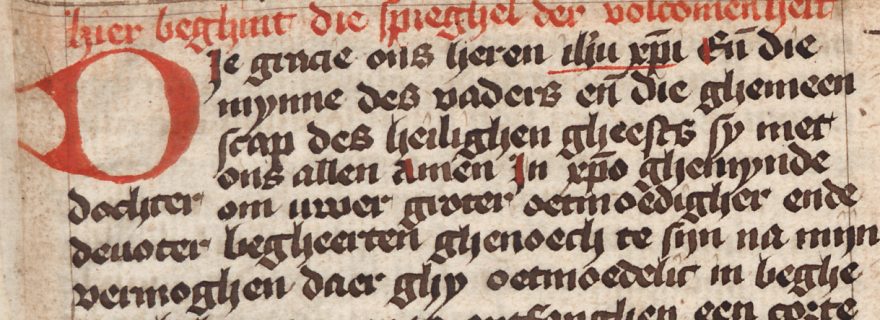Spiritual Contemplations at Leiden
How to attain a truly perfect life
“For the satisfaction of thy humble and devout desire, to the best of my ability, since thou hast humbly desired to receive from me a brief doctrine and instruction, on how to attain a truly perfect life.”
Thus wrote Hendrik Herp (d. 1477) in the preface to his Spieghel der volcomenheit (Mirror of Perfection, c. 1455–1460). With this handbook for a contemplative life, he submitted to the request of a lady from a lay environment and benefactress of the Observant Friars. A few years earlier, during a voyage to Rome in 1450, Herp had exchanged the Brothers of the Common Life for adherence to the Franciscan Observance, a movement within the order of the Friars Minor who propagated the strict observance of the rules of St Francis. Herp’s Spieghel enjoyed a wide circulation in manuscript and print, and found an audience throughout Europe with translations into German, Latin, Italian, Spanish, Portuguese and French.
In this manuscript, once in the possession of the Leiden Tertiary Sisters of St Clare/Nazareth, parts of the Spieghel have been integrated into a carefully composed spiritual syllabus. The Observant Friars were responsible for the spiritual wellbeing of the ladies of the convent of St Clare. In 1455, they founded a new monastery just outside the city limits – one of the first establishments of the Franciscan Observance in the Low Countries. The manuscript, with parts from one of the most important texts to have emerged in the bosom of this reform movement, played a role in the Observants’ pastoral care for the Tertiary Sisters.
During the symposium Praten als Brugman, Schrijven als Herp (Talking like Brugman, Writing like Herp, (14 June 2013, Leiden UB), the influence of the Franciscan Observants on late Mediaeval literature, culture and religion has been further explored. The accompanying web exhibition, curated by Anna Dlabačová (Leiden University) and Daniëlle Prochowski (University of Antwerp), highlights various aspects of the influence of the Franciscan Observance on the literary discourse in the Low Countries at the hand of objects from the collections of the Leiden University Library. Moreover, three Leiden manuscripts of the Spieghel der volcomenheit (LTK 340, LTK 1129 and LTK 222) have been made digitally accessible with the support of the ‘NWO Mozaïek’ project Mysticism for a new age: Hendrik Herp’s Spieghel der volcomenheid in manuscript and print (c. 1455/60 – 1552) and the Franciscan Observance in the Low Countries, by Anna Dlabačová.
Post by Anna Dlabačová, a PhD researcher affiliated with LUCAS (Leiden University Centre for the Arts in Society).
.jpg)



